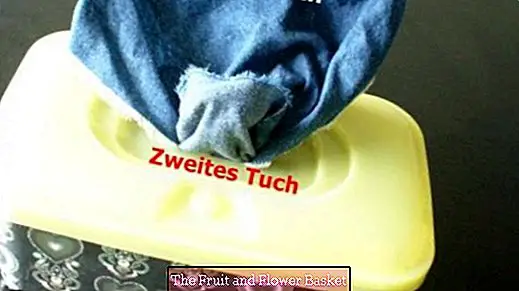Produce antibacterial wipes
Used textiles can be made with a few ingredients antibacterial disposable cloths.
Boxes of wet wipes, baby oil or baby wipes, and lots of textiles to be disposed of, such as bed linen, tablecloths, tea towels, shirts, shirts, nightgowns, blouses, etc., are likely to be found in almost every household.
If both are no longer needed, you should not dispose of it carelessly:
Both together become a practical household helper:
Disinfecting disposable cloths!
The cloths can be used in a variety of applications where disinfection is required and this is done in a mild and natural way: all that is needed is household vinegar and tea tree oil.
The textiles are cut / cut into pieces of the same size, exactly the same size as the former cloths that were in the box.
If no cloth is left as a template, the bottom of the box serves as a template.
The cloths are now soaked in a vinegar-tea tree oil mixture:
On 2 cups white household vinegar come 50 drops Tea tree oil.
Tea tree oil has antibacterial properties and is, among other things, a natural disinfectant.
Now wring the wipes and fold as follows:
A third of a cloth is placed under the upper cloth, turned up and knock down the upper cloth again.
Continue until all wipes have been used up.
Maybe the pictures help to better understanding.
If you now pull a cloth out of the box, the second follows automatically, as it is also usual with care cloths in the box.
Even denim, as I've used it, comes easily out of the box.
On the first photo you can clearly see that the light jeans piece automatically pulls out of the box as soon as the darker one is removed. The other photo may make it clear.
Once you know how to do it, it's done quickly and helpful in the bathroom and kitchen.
If you do not like tea tree oil, you can also make a natural disinfectant from sage leaves:
Add a bunch of fresh sage with 2 cups of white vinegar to a well-closed container and let it rest for at least 4 weeks. Then put in a spray bottle or soak the cloths before they come in the box.
Sage can be used against E. coli bacteria, Salmonella and Candida. Few herbs have this powerful antibacterial power.





